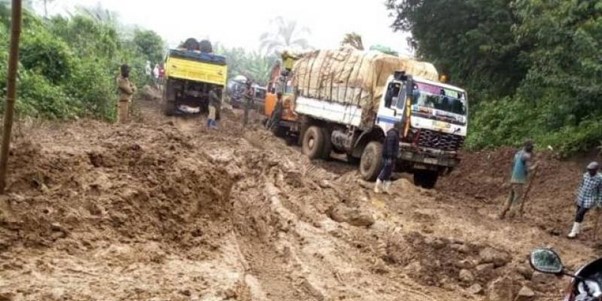Four Dead After Torrential Rains In DR Congo

Four persons were reported dead and several properties damaged after torrential rainfalls in the Kalehe territory in South Kivu, Democratic Republic of Congo.
The rains also rendered the Bukavu-Goma road in the territory impassable.
According to Delphin Birimbi, president of the Kalehe civil society discussion group, several rivers in the village of Bushushu in the Mbinga south grouping overflown their banks following the torrential rains on the number two national highway between Bukavu and Goma.
“It is since November 18, 2020, around 19:45 hours that we noticed that several rivers had burst their banks following heavy torrential rains on the number two national highway between Bukavu and Goma,” Birimbi said.
“To be precise, along the Nyamukubi-Rambira track. It is already four days now since circulation on the highway between Bukavu and Goma has been disrupted.”
In a letter to the Governor asking for assistance, the civil society outfit disclosed that four persons lost their lives and the road linking the two towns has been cut in several places.
“The balance sheet is two persons dead, two others missing, houses flooded in Nyamukubi, Kanyonyo and Tchabondo, roofs carried away by the storm in Lushebere quarter in the village of Bushushu, Mbinga North. There was also considerable damage in Makengere,” the letter to the Governor reveals.
HumAngle reports that many houses along the number two national highway linking Bukavu to Goma are built in areas which are today considered as dangerous due to the rampant avalanches there and the civil society outfit has called on the inhabitants in the areas to quit the zone.
Since the arrival of the coronavirus pandemic in the Democratic Republic of Congo occasioning the loss of gainful employment, some inhabitants of Goma and Bukavu have taken up the road transport business as well as other commercial activities.
Most of the vehicles the people use for transportation have been blocked along the Bukavu-Goma highway for four days now.
“This is really very disquieting. How can the government allow such an important national highway to be blocked for four days without doing a thing to remedy the situation? asked a civil society activist who did not want to be named in the press.
“They don’t seem to realize the negative economic consequences of this blockage especially coming at a time when the coronavirus has been wreaking havoc on an already battered economy in this region.”
Support Our Journalism
There are millions of ordinary people affected by conflict in Africa whose stories are missing in the mainstream media. HumAngle is determined to tell those challenging and under-reported stories, hoping that the people impacted by these conflicts will find the safety and security they deserve.
To ensure that we continue to provide public service coverage, we have a small favour to ask you. We want you to be part of our journalistic endeavour by contributing a token to us.
Your donation will further promote a robust, free, and independent media.
Donate HereStay Closer To The Stories That Matter




